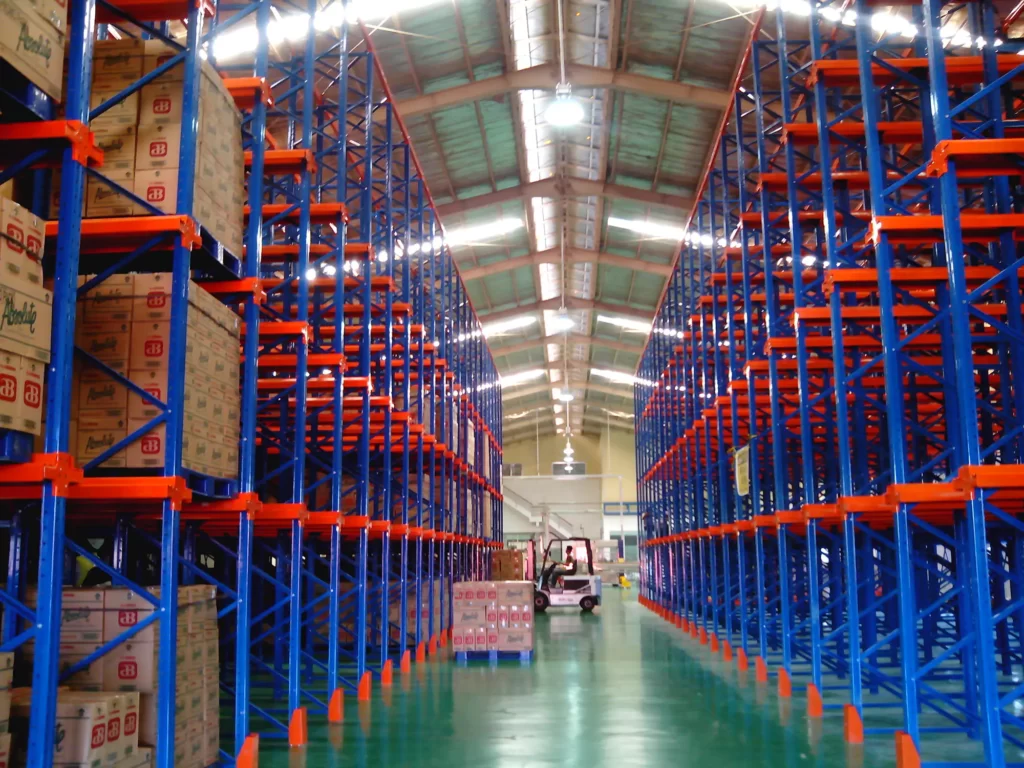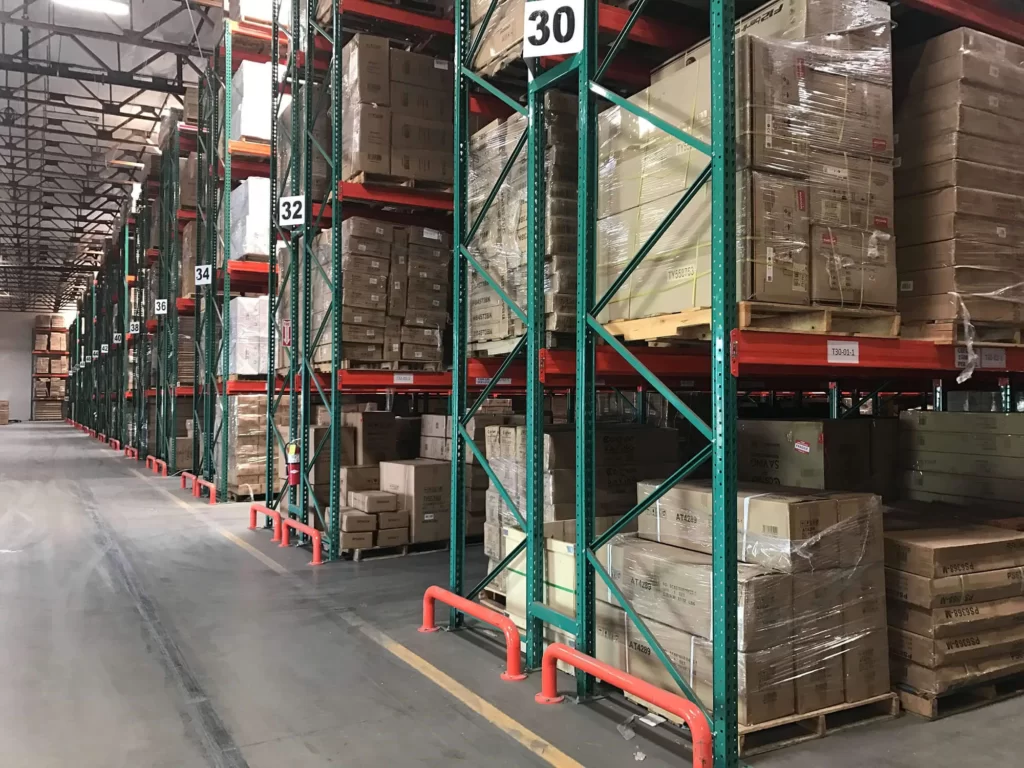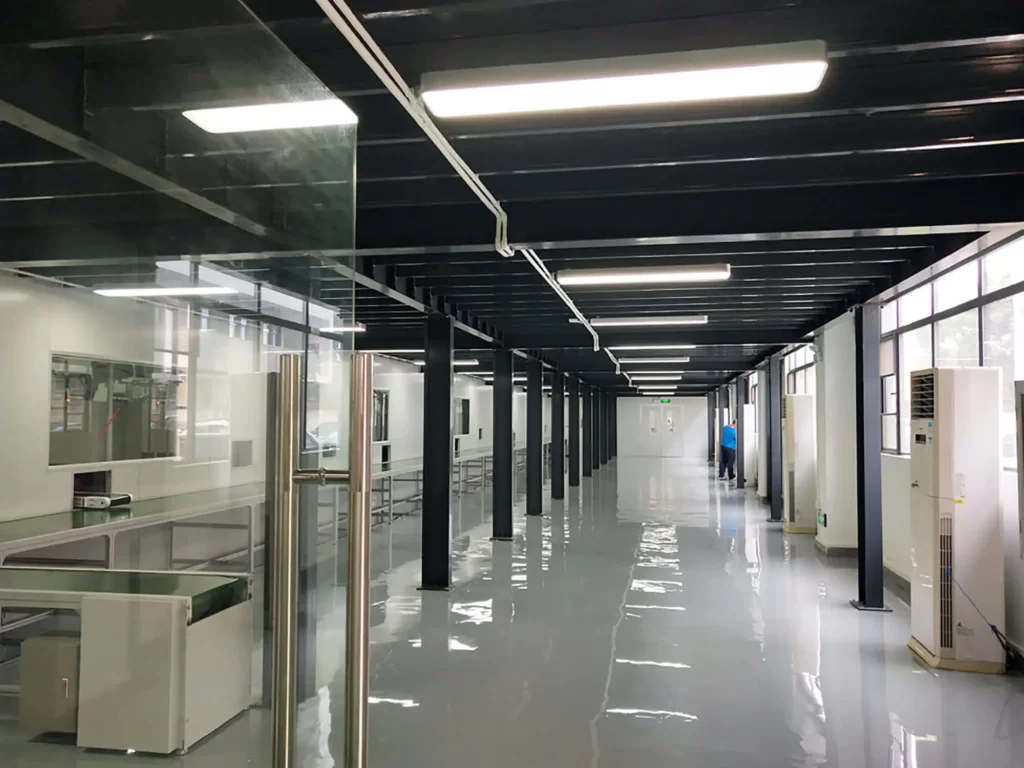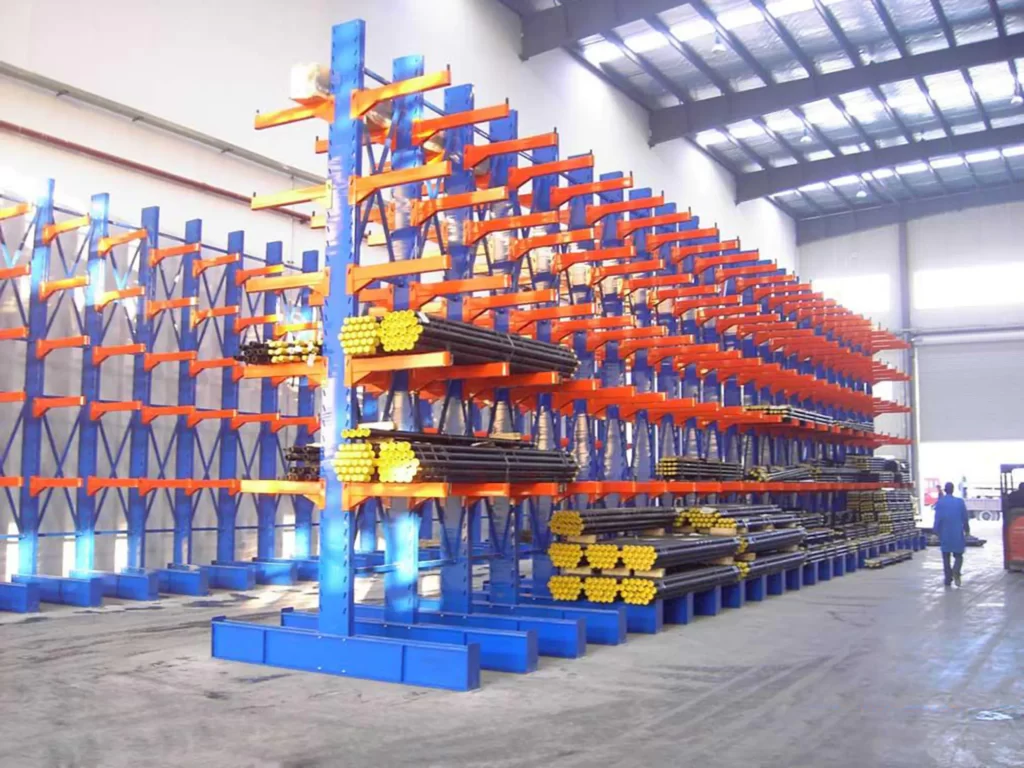Are you struggling with inefficient storage of your heavy-load items in your warehouse? Well! A heavy-duty racking system must be your top priority. It is constructed of high-tensile steel which enables it to manage the heaviest loads. Moreover, it significantly increases capacity, improves accessibility, and mitigates safety concerns simultaneously. Whether it’s a warehouse, factory, or distribution centre, the right system changes your space into an ergonomically optimal storage area.
In this blog, we’ll discuss the functionality of heavy-duty racking, its types, distinctive features, strategies for purchasing, and real-life use cases so that you are better equipped to make a decision.
Figure no 1 Industrial Heavy-duty Racking Guide
1) Introduction to heavy-duty racking System
Heavy-duty racking refers to an efficient storage system that is designed to support large and heavy loads in both commercial and industrial settings. They allow you to store goods up to 12 meters high, therefore improving efficiency and organization in warehouses, factories, and logistics centres.
- Main Characteristics
? Remarkable Strength-Holding Capacity: Heavy Duty Racking is specially designed to bear a weight of about 1,000 kg to 5,000 kilograms per shelf used, depending on the type of rack and configuration used. Moreover, the beams range from 1.5 mm to 3.0 mm in thickness and are C-section or box type, so these are bound to take considerable static and dynamic loads.
? Precision Engineering for Stability: Moreover, every racking system is critically analysed with FEA (finite element analysis) to ensure maximum efficiency of the structure considering load, weight, and material utilization.
Figure no 2 Features of Heavy duty racking system
? Maximized Space Efficiency: As previously mentioned, warehouses also need to be as effective as possible in terms of space usage. Thus, heavy-duty racking enables high-density storage with aisle space of as little as 1.6 m when used with VNA (Very Narrow Aisle) forklifts. Moreover, these systems can be set up for double deep pallet storage, which can save up to 40% of the aisle space compared to traditional racking systems.
? Durable and Corrosion-Resistant Materials: Racks and shelving in industrial storage settings are subject to moisture and dust, along with mechanical damage which could result in corrosion as well as degrade the structure over time.
In order to avoid that, heavy-duty racking is provided with an epoxy or galvanized coating of 60-100 microns thick which ensures more than a decade’s worth of protection against corrosion even in high-humidity warehouses.
2) Types of Warehouse Heavy-Duty Racking
i) Selective Pallet Racking System
Selective pallet racking is a type of rack used for your ease of access to single-pallet storage. It consists of upright frames, horizontal beams, and pallet supports. Thus, owing to its structural components these easily are accessible for the forklift ( a truck lift used to move materials) to directly retrieve the stock. Those types of systems are most suitable where frequent stock rotation occurs like the foodstuffs, consumer goods and manufacturing components under FIFO ( First IN, First out method in which old items get removed before the new ones arrive).
Figure no 3 Selective pallet rack
ii) Drive-In and Drive-Through Racking
For high-density storage spaces, drive-in and drive-through racking has no or fewer aisles ( a linear narrow space between rows ) which allows more space optimization. These systems have deep storage lanes with frames made of steel and horizontal rails for the forklift access throughout the structure.
Moreover, Drive-in racking uses LIFO ( Last-in, First-out method, which prefers selling newer items first ) and is only recommended for bulk storage with low turnover. Similarly, Drive-through racking uses FIFO and is ideal for proprietary brands of dairy products, beverages, and pharmaceuticals.
Figure no 4 Drive-in rack
iii) Cantilever Racking
Cantilever racking differs from other racking systems discussed above since it is specifically designed for long and bulky materials not for palletized. Keep in mind that cantilever racking consists of vertical columns with arms extending outward. Thus, with this open-front design, loading and retrieval is easy. Moreover, because of this, it is preferred in hardware stores, lumber yards, and metal fabrication plants for storing construction materials, furniture, pipes, and lumber.
Figure no 5 Cantilever rack
iv) Push-back and Pallet Flow Racking
For some companies looking to improve their inventory movement, push-back and pallet flow racking utilize gravity to improve efficiency. Push-back racking is based on a LIFO system and caters to high-density, non-perishable items while pallet flow racking ensures stock rotation following FIFO. This is crucial for the food processing, cold storage, and even pharmaceutical sectors where there is high precision needed for inventory turnover.
Figure no 6 Push back pallet rack
v) Mezzanine Racking Systems
Mezzanine racking is a category of warehouse heavy-duty racking system and is ideal when floor space is limited since it utilizes vertical space. Moreover, it is usually made of platforms raised with steel and supported by heavy-duty uprights. Thus, it enables the addition of conveyor belts, shelving, or Workstations without the need to expand the building. Due to the need to increase storage while still maintaining accessibility, it is a practical choice for e-commerce fulfilment centres, automotive warehouses, and manufacturing plants.
Figure no 7 Mezzanine rack
vi) Double deep pallet racking
Double deep pallet racks consist of two rows of pallet racks placed back-to-back, maximizing the space while minimizing aisle space needed. A deep-reach forklift is required to retrieve the second pallet which makes it excellent for high-density storage. This system works most effectively when multiple pallets of the same product are stored to maintain a balance between efficiency and access. If the goal is to optimize warehouse space without entirely sacrificing selectivity, then this racking configuration would be best.
Figure no 8 Double-deep racking
If you want to get any of the above types of warehouse heavy-duty racking systems, then look no further than Mracking. We are China’s best custom warehouse racking and mezzanine manufacturer. Moreover, we’ll also provide you with 3D designs for ease of installation. So, reach us today!
- Comparison Table
| Load capacity (kg/pallet) | Storage depth | Best for | Storage efficiency | Accessibility | |
| Selective Pallet Racking | 1,000 – 3,000 | 1 pallet deep | High-turnover goods | Moderate | High |
| Drive-In/Drive-Through | 1,500 – 5,000 | 4 – 10 pallet Deep | Bulk storage of similar products | High | Low |
| Cantilever Racking | 500 – 2,000 per arm | Variable | Long, bulky items | Moderate | High |
| Push-Back Racking | 1,000 – 2,500 | 2 – 6 pallet Deep | High-density storage | High | Moderate |
| Mezzanine Racking | 500 – 1,500 per m² | Multi-level | Extra storage space | Very High | Moderate |
| Double-deep Pallet Racking | 500–2,000 | 2-pallet deep | Storing high volumes | Increases storage capacity by up to 30% compared to selective racking. | Moderate |
3) How to select the right Industrial Heavy-Duty Racking for sale?
However, do remember! strategic consideration is needed when selecting preferred heavy-duty racking systems. So, here we’ll present the systems selection criteria that ensure accuracy, safety, and value for money.
i) System Weight Limit and Load Capability
To begin with, ascertain the total weight that will be supported by the racking system. The reason is that structural failure, damaging the equipment, and posing serious safety hazards are some consequences of overloading. So, choose racks that satisfy your storage needs. However, remember to always check the manufacturer’s load ratings. Moreover, different industries have specific weight requirements.
Figure no 9 Measuring heavy-duty rack capacity
ii) Space Availability In the Warehouse
Next, you also need to think about the warehouse space that is available to you. In case you have a large floor area, wide horizontal racking should work best. However, vertical racking is preferable if your limited space hinders expansion of your warehouse footprint, while still allowing the storage of more items. Moreover, vertical racking ensures that forklifts and other workers have enough room to manoeuvre safely, averting delays and accidents, which ensures safety and strengthens workflow.
iii) Accessibility and Inventory Management
Consider not just space but also how inventory can be accessed. If your business handles food items, a First-In-First-Out (FIFO) method, then, pallet flow racking, is best for keeping stock fresh. Conversely, storing non-perishable items can be more efficiently done using push-back racking. Additionally, automation through warehouse management software allows real-time inventory retrieval and, further integration through the racking system can provide improved productivity and minimise errors.
iv) Material and Build Quality
Similarly, you also have to consider the material and build quality of the racking system. Keep in mind that for warehouses dealing with heavy loads, steel becomes an ideal choice for its strength and durability. On the other hand, aluminium is beneficial in humid regions as it is lighter and rust-resistant. Moreover, if located in a high moisture or chemical-infested area, racks are better off with protective coatings to lessen the chances of corrosion.
v) Adhering To Safety Regulations:
Lastly, heavy-duty racking must ensure the following global safety standards:
- ISO 9001: Guarantees the control of tested materials and their preservation.
- FEM 10.2.02: Governs the performance of static and dynamic load of variables.
- SEMA & RMI guidelines: Control the design of racks with regard to action of impact.
- OSHA 1910.176: Deals with Warehouse storage safety.
4) Applications of Industrial Heavy-Duty Racking
You know businesses across the globe optimize and enhance their storage functions using industrial heavy-duty racking. Now, let’s explore how the Industrial and manufacturing sectors get benefits from them!
+ Manufacturing and Warehousing: Manufacturing and warehousing require a storage system that keeps raw materials, spare parts and finished products in good order and easy to access. Besides all, selective pallet racking is well suitable for this purpose because it makes inventory management easier by providing direct access to stored items thereby reducing stock misplacement or inventory shrinkage.
+ Automotive Industry: Moreover, standard racking systems will not work for long and heavy materials like steel beams and pipes as well as other assorted automotive parts. Thus, cantilever racking is custom-made to store such bulky items and ensures that they are stable. This setup enables speedy retrieval of materials and ensures a tidy storage area.
Figure no 10 Uses of Industrial heavy duty racking
+ Retail and Wholesale Storage: A supermarket or distribution centre operator would require a storage system to accommodate bulk packaged goods. In these settings, drive-in and push-back racking systems are suitable because they provide effortless stock rotation and optimize available space. With these systems, forklifts have easy access to deep storage lanes which do not require excessive handling time.
+ Cold Storage and Food Industry: Similarly, inventories of frozen or perishable goods must be kept at optimal flow, otherwise rot will result. Thus, here comes the role of pallet flow racking, also referred to as gravity-fed rollers. This system is designed to ensure the older stock is used first, sustaining product freshness and minimizing waste.
+ E-commerce and Logistics: The growth in online shopping has necessitated new fulfilment centre storage techniques for dealing with large quantities of small orders. Thus, Mezzanine racking is perfect since it allows vertical space usage without expanding floor space. This system enables better order organization, accelerates the picking process, and guarantees fast deliveries.
5) Installation and Maintenance Tips
Like another storage system, the setup and maintenance of a heavy-duty racking system should be done with lots of care for safety and efficiency. Below are several pointers that will keep your system secure, and make it last longer.
- Best Practices for Installation
Proper installation guarantees stability and the effectiveness of the process. For instance; effective spacing and correct placing of racks are vital to allow safe access as well as the movement of goods in and out of the store. If the racks are placed too close together, it will be difficult for workers and forklifts to manoeuvre around, which will further increase the risk of accidents.
Also, the racks must be adequately anchored to the floor, as this prevents them from shifting or falling due to heavy loads being handled. However, be sure to follow the manufacturer’s recommendations and use quality anchors. Along with that, the local regulations on safety have to be checked and complied with.
In addition, checking with local authorities, or hiring a professional installer, can help you meet these requirements.
Figure no 11 Warehouse rack maintenance
- Safety and Routine Maintenance Procedures
Furthermore, proper upkeep after setting up a racking system is essential to keep it functional and useful over the long term. So, you have to ensure the following tips!
Racks should be routinely checked for any damage that might include bent beams, corrosion, and loose bolts. Small problems can be fixed easily, but without rectification, bigger issues can arise which are more expensive to resolve.
Another important aspect is weight distribution. Imbalance on any one side over-simplistically leads to structural weakening over time. So, make sure that the system is balanced and lifts have been done within the appropriate limits so as to not cause a risk of toppling collapse.
6) Conclusive Notes
In short, finding the proper heavy-duty racking system can transform your storage space’s efficiency, safety, and organization. Whether you’re handling bulk inventory or caching a warehouse, a racking system always gets the job done. However, buying directly from a trustworthy manufacturer is equally important.
So, if you want to get any type of customized warehouse storage solutions, then Mracking must be your top priority. We have 18 years of experience in the production line and export product to almost 40+ countries. So, don’t allow storage to hold you back from achieving greatness—invest in a high-quality, reliable storage unit. So, request an instant quote to upgrade your warehouse today.








